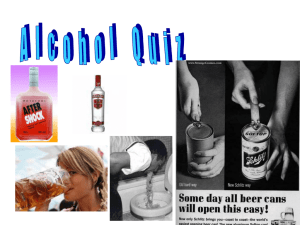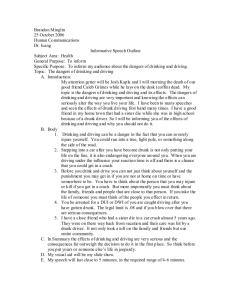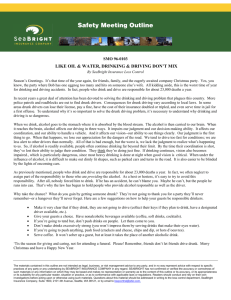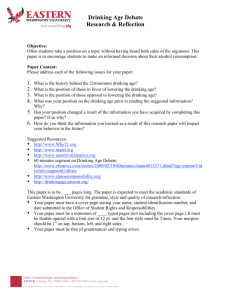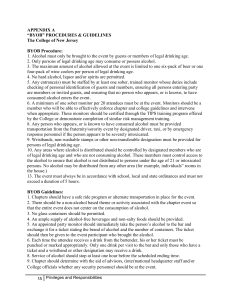Watch your drinking this Carnival - Catholic Commission for Social
advertisement
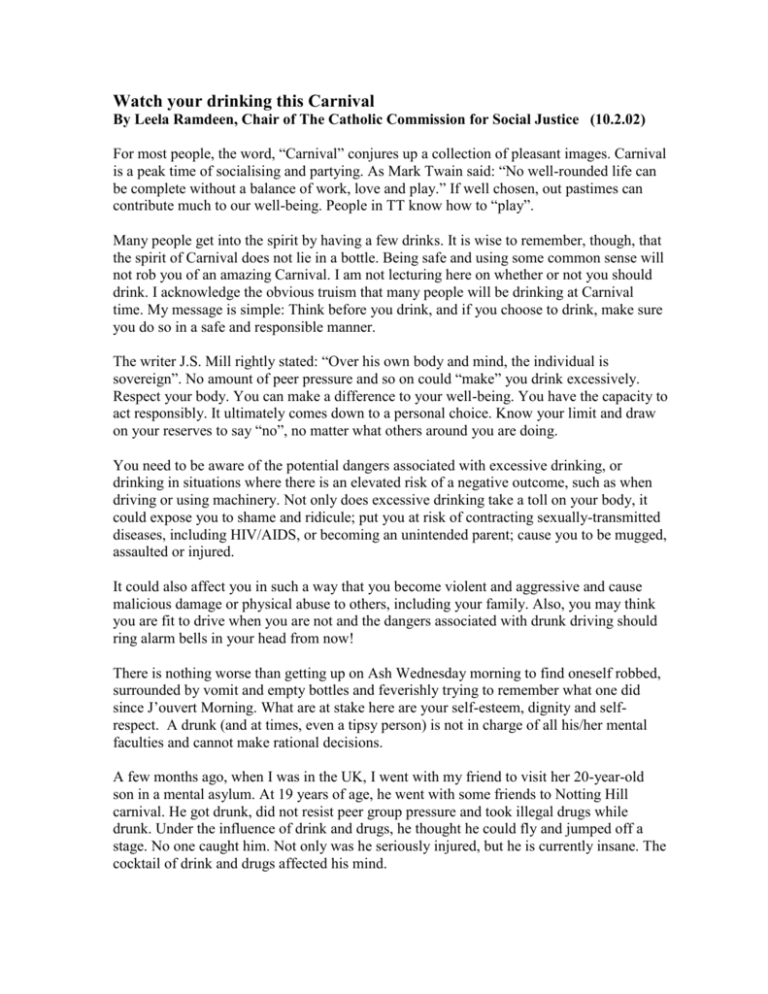
Watch your drinking this Carnival By Leela Ramdeen, Chair of The Catholic Commission for Social Justice (10.2.02) For most people, the word, “Carnival” conjures up a collection of pleasant images. Carnival is a peak time of socialising and partying. As Mark Twain said: “No well-rounded life can be complete without a balance of work, love and play.” If well chosen, out pastimes can contribute much to our well-being. People in TT know how to “play”. Many people get into the spirit by having a few drinks. It is wise to remember, though, that the spirit of Carnival does not lie in a bottle. Being safe and using some common sense will not rob you of an amazing Carnival. I am not lecturing here on whether or not you should drink. I acknowledge the obvious truism that many people will be drinking at Carnival time. My message is simple: Think before you drink, and if you choose to drink, make sure you do so in a safe and responsible manner. The writer J.S. Mill rightly stated: “Over his own body and mind, the individual is sovereign”. No amount of peer pressure and so on could “make” you drink excessively. Respect your body. You can make a difference to your well-being. You have the capacity to act responsibly. It ultimately comes down to a personal choice. Know your limit and draw on your reserves to say “no”, no matter what others around you are doing. You need to be aware of the potential dangers associated with excessive drinking, or drinking in situations where there is an elevated risk of a negative outcome, such as when driving or using machinery. Not only does excessive drinking take a toll on your body, it could expose you to shame and ridicule; put you at risk of contracting sexually-transmitted diseases, including HIV/AIDS, or becoming an unintended parent; cause you to be mugged, assaulted or injured. It could also affect you in such a way that you become violent and aggressive and cause malicious damage or physical abuse to others, including your family. Also, you may think you are fit to drive when you are not and the dangers associated with drunk driving should ring alarm bells in your head from now! There is nothing worse than getting up on Ash Wednesday morning to find oneself robbed, surrounded by vomit and empty bottles and feverishly trying to remember what one did since J’ouvert Morning. What are at stake here are your self-esteem, dignity and selfrespect. A drunk (and at times, even a tipsy person) is not in charge of all his/her mental faculties and cannot make rational decisions. A few months ago, when I was in the UK, I went with my friend to visit her 20-year-old son in a mental asylum. At 19 years of age, he went with some friends to Notting Hill carnival. He got drunk, did not resist peer group pressure and took illegal drugs while drunk. Under the influence of drink and drugs, he thought he could fly and jumped off a stage. No one caught him. Not only was he seriously injured, but he is currently insane. The cocktail of drink and drugs affected his mind. Our schools should educate students about the dangers of alcohol consumption and of taking illegal drugs. Such education should be creatively integrated into the context of the overall health and lifestyle educational process. We should all reflect on the major health risks associated with excessive drinking – heart disease, liver cirrhosis, high blood pressure, stroke and cancer. It is difficult to state what constitutes “moderate consumption”, because alcohol can have different effects on different individuals. This will depend on your age, size, sex, health and how and when you consume alcohol as both the speed of consumption and drinking with food will affect the absorption of alcohol. Sensible drinking means drinking enjoyably, sociably, and responsibly. It includes not drinking at all in situations when the effects of alcohol will put someone’s safety or health at risk. It also means being aware of the risks to young people of drinking alcohol and setting an example of moderation. Some countries define “moderate drinking” as the level of drinking that possesses a low risk of alcohol-related problems, both for the drinker and for others. Consider the following tips: 1. 2. 3. 4. 5. 6. Don’t drink while on certain medications, as some can interact adversely with alcohol. Ask your doctor. Plan how you will get home before you even leave the house – whether it be designating a driver, catching a cab or other public transport, or arranging for someone to pick you up. Don’t let excitement, emotion, peer pressure or the fact that you are at an allinclusive fete and the drinks are included in the entry fee be excuses for poor decision-making. Discourage other people from driving if they had had too much to drink. If you are planning to drink, pace your drinking. Take it slowly. Make sure you eat before and during the consumption of alcohol. Alternate your alcohol drinks with non-alcohol beverages. Know when to stop. Remember that your blood alcohol level can continue to rise after you have stopped drinking. Also, excessive drinking the night before can have an impact on your blood alcohol content the next day. Don’t selfishly put the lives of other road-users at risk by drunk driving. Do have fun! Enjoy!


